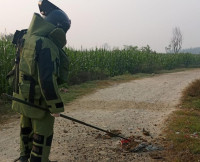National
TRC rues lack of funds for investigating cases
The Truth and Reconciliation Commission, which faces scathing criticism for delaying investigation into the war-era cases of human rights violations, has said its work will be bogged down deeper since the government hasn’t released funds necessary for the probe.Forty days after the new fiscal year, the TRC has received budget enough only for the salary of its staff while there is no money to cover their travel expenses or payments for the services of experts investigating the cases.
Binod Ghimire
The Truth and Reconciliation Commission, which faces scathing criticism for delaying investigation into the war-era cases of human rights violations, has said its work will be bogged down deeper since the government hasn’t released funds necessary for the probe.
Forty days after the new fiscal year, the TRC has received budget enough only for the salary of its staff while there is no money to cover their travel expenses or payments for the services of experts investigating the cases.
The commission’s total budget for the current fiscal year is Rs117 million, which includes salary, travel costs, and a stipend for employees, as well as allowances for the victims who need to travel to the TRC offices to record statements. The commission has seven offices at the provincial level and a central office in Kathmandu.
The government released Rs37.70 million from the state coffers in mid-July, while agreeing to transfer Rs80 million granted by Germany to the Peace Fund. However, officials at the commission say there has been no progress in transferring the money received from Berlin.
“Our provincial offices have been doing nothing but administrative works since July 17,” Lila Udasi Khanal, a member of the commission, told the Post.
“Investigation is impossible without travel, and we don’t have money for it.”
A majority of the investigation staff at the provincial offices are deputed from the respective District Attorney Offices, whose allowances have to be covered by the commission. The TRC has also hired experts as consultants to support investigation.
Khanal says the commission hasn’t been able to employ any of those officials in the lack of funds. Furthermore, payments to the victims who have to travel to the provincial offices to record statements have stopped too. During preliminary investigation, the TRC has been reaching out to the victims to verify the complaints they have filed and to record their statements whenever necessary.
Umesh Prasad Kafle, chief accounts officer at the commission, said that the commission is so cash-strapped that it can’t even pay for its internet services. “We have been constantly asking the Ministry of Finance to expedite the allocation process,” he told the Post. “The sooner the better.”
A senior official at the Finance Ministry said that some technical glitches have led to the delay, which officials expect to fix soon.
“We have already gotten consent from the donor country and it is on course to the state treasury,” said Shree Krishna Nepal, chief of the International Economic Cooperation Coordination Division at the ministry. “It shouldn’t take long.”
The TRC was formed in February 2015 to look into cases of human rights violations during the decade-long Maoist conflict and to recommend appropriate actions against the perpetrators.
In the three-and-a-half years since its formation, the commission has completed preliminary investigation into hardly 2,800 cases among the 63,000 filed to it without even entering into detailed probe.




 22.59°C Kathmandu
22.59°C Kathmandu















